By: Aqsa Iqbal
Solid waste management situation in Pakistan is a matter of grave concern as more than 5 million people die each year due to waste-related diseases as stated by Al Jazeera. According to the BioEnergy Consultant, Pakistan generates approximately 20 million tons of solid waste per year, with an annual growth rate of about 2.4 percent. The Government of Pakistan speculates that 71,000 tons of Solid Waste is produced each day, mostly from major metropolitan areas. Karachi, the largest city in the country, generates more than 9,000 tons of municipal waste daily. All major cities like Islamabad, Lahore or Peshawar, are facing prodigious challenges in addressing the problem of urban waste. Mixed municipal waste is either dumped indiscriminately in the neighborhood or if collected by the Garbage Collection Service disposed of in an unchecked middens. The root factors for the worsening garbage problem in Pakistan are lack of urban planning, outdated infrastructure, and most importantly lack of public awareness. In Pakistan, the 5th largest populated country in the world, more waste is being produced than the number of facilities available to manage it. Some of the major problems include improper waste collection system and dumping of waste on the streets. Waste segregation viz sorting of trash into dry and wet waste is not practiced properly. There are no controlled sanitary landfill sites and open burning is quite common. As a consequence of these issues, waste is accumulating and amassing on roadsides, canals, and other common areas and burning of trash has become so common and causing hazardous toxins to be exposed thereby threatening human and environmental health. Deplorably, citizens are not aware of the relationship between reckless waste disposal and resulting environmental and public health problems.
Among the already limited number of landfill sites that are present in Pakistan, fewer are operational. Karachi being Pakistan’s largest city utilizes two landfill sites so does Lahore, the country’s second largest metropolis. Even within Pakistan’s capital, Islamabad, there are no permanent landfills to be found. So, we can esstimate how unfortunate the situation can be in underdeveloped and remote areas of Pakistan.
Mentioned below are some applicable propositions which can be used to address the issues of solid waste management.
- More than half of what we carelessly throw into the trash is organic matter, which if composted, can produce rich top soil for our plants. Though the LWMC is working in phases, 100% collection rates are not seen yet. In Lahore, 27% of dry recyclables are informally recycled within the city. Additionally a composting plant converts 8% of waste into compost. Compost is considered an attractive product because of its possible use as a soil conditioner for agricultural use but unfortunately most of us do not segregate our dry waste from wet waste, which makes composting impossible. The precious wet waste — what can potentially become black gold — remains unusable junk inside our landfills just because of lack of awareness of common citizens.
- Vermicomposting that is composting through earthworms which is practiced in many other countries including India. This low price yet highly efficient process is used to enhance the process of waste conversion and to produce a better product. Plus less segregation of waste is required as compared to simple composting. If properly planned and executed, the benefits from vermicomposting project can make this technology a cornerstone of sustainable development.
- Land application of poultry and livestock manure should be managed to recycle plant nutrients rather than for disposal otherwise it will be the wastage of a highly effective organic fertilizer.
- Huge heaps of mixed waste which are dumped on the streets and in ponds without segregation can be used to produce maggot meal which is a rich source of animal protein in fish and poultry diets. Maggot feed is noted to reduce keets mortality by close to 100% and are also a perfect replacement for current orthodox protein product offering in the market like soybean and carnivorous fishmeal and thus make farmers’ investment attractive.
- To generate biogas by landfilling and provide it to the residents of the respective villages which can also act as a renewable energy resource.
- Installation of dual bin system to reuse the waste and conserve the natural resources at the source of generation.
Awareness creation and implementation of ideas will not only help in achieving the objectives to combat climate change by reducing significant amount of greenhouse gas (methane) emissions but also contribute to the regional and national sustainable development. It will also enable the waste management companies to earn revenues as well as cut costs and become sustainable.
Although SWM policies do exist, the levels at which they are implemented and enforced lack as a result of the governmental institutions lacking resources and equipment. These institutions are primarily led by public sector workers and politicians who are not necessarily the most informed on waste management. For improvements in municipal solid waste management, it is necessary for experts to become involved and assist in the environmental governance.
Due to the multiple factors contributing to the solid waste accumulation, the problem has become so large that it is beyond the capacity of municipalities. The former director of the Pakistan Council of Scientific and Industrial Research, Dr. Mirza Arshad Ali Beg, stated, “The highly mismanaged municipal solid waste disposal system in Pakistan cannot be attributed to the absence of an appropriate technology for disposal but to the fact that the system has a lot of responsibility but no authority.” Laws and enforcement need to be revised and implemented. The responsibility for future change is in the hands of both the government, and the citizens.
Waste management practices in Pakistan need to be improved. It can be initiated by creating awareness regarding the harmful impacts of dumped and unexposed waste on public and environmental health. It is imperative for the general public to become environmentally educated, have a change in attitude and take action.
The writer is a student at University of Veterinary and Animal Sciences, Lahore. She can be reached at [email protected]






